Muscle Beach
Quinn Latimer
September 24, 2019
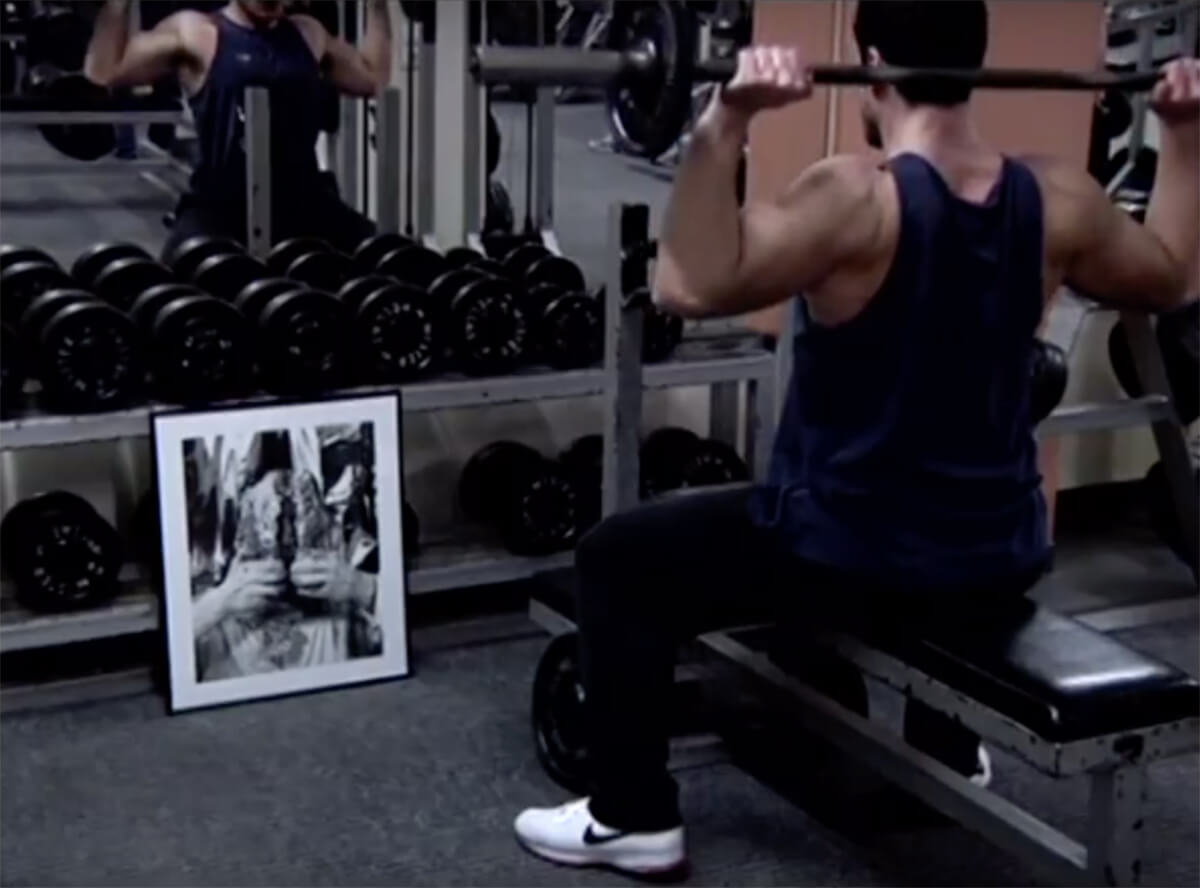
Trying to be stronger for you.
—Lana Del Rey, “Venice Bitch”
This is not another essay about Kathy Acker.
It’s about the body and language, reps and repetition—about writing’s relationship to the refrain, what is recited, the reps of language and the rhythms of temporality, its tempos and time signatures, its rush and release and stillness of pace. It’s about alienation and the alien body, bodies and bodies of language. It’s about what comes back—about, what, a childhood spent at Muscle Beach.
Or none of these things, perhaps.
Anyway, Acker.
(I didn’t know her—I was a child—I barely read her—does anyone?—but it’s true, she’s—what—everywhere.)
And yet.
Earlier this summer I woke up one day in Athens and went to the market.1 I bought onions and flowers and artichokes, among other purchases and other others, and then I went for a long run. Afterwards I worked out my upper body at a small gym on a narrow street punctuated by dumpsters and cafes and boarded-up neoclassical ruins amid the dirty marble polykatoikia.2 The gym was empty; I was happy. I came back to the apartment and wanted to take a long bath, with some fluorescent salts for my muscles; I wanted to read and relax. But I had promised a young gallerist in the neighborhood that I would attend his reading group devoted to Kathy Acker’s essay on bodybuilding. I had also promised the artist who was leading it.3 I was reminded of both of these promises when I said maybe I wouldn't go. I went.
I hadn’t read Acker’s essay since college or I had never read it—I couldn’t remember. We read it together, anyway, a group of Greek and foreign artists and gallerists and poets and “cultural workers” around two long white IKEA tables pushed together. The gallerist brought out cookies—which seemed counter to the physical fitness that was our ostensible subject but okay—and his dog kept barking.4 For hours. For hours we read the bodybuilding essay and discussed it. There was some pleasure in this, I’ll admit. I made lots of notes and talked a lot, as I always do, and was a bit embarrassed after, as I always am. Mostly the foreigners spoke. I noted this. Our mouths in perpetual motion, as it were. Our bodies shifting in cheap chairs, comfortable, uncomfortable, attempting then asserting then abandoning good posture. Underneath the table my legs ached. It felt effortless to receive Acker’s essay, to stay there all day, if necessary, marking its various passages, scribbling disparate associations, because I was in a kind of total, ambient zone of exhaustion—less emptiness than its opposite, which is its post-work-out apposite state. Limit, lack, void, empty, exhaust, extant: the apposite lexicon one reaches for to describe physical exercise and its ludic endgames. One or me, let’s see.
Of her “Language of the Body,” a “Language Which is Speechless,” Acker writes, “Imagine you are in a foreign country.”5 Since I live in a foreign country—and thus this feeling no longer feels alien to me—I recall my first feeling of total foreignness: I was a child in Venice Beach, where I was born. (Is it strange that my first feeling of foreignness was felt in the place where I grew up? Perhaps.) Venice Beach was also called Muscle Beach, then. It sometimes is still. Around the corner from our apartment was Gold’s Gym, where Arnold and others pumped iron. In the summers, lots of European tourists would come to Venice. Some of them, naturally or unnaturally, were bodybuilders. It was the thing, then. Even my mother did it: drinking protein shakes and swallowing raw eggs in the morning, wearing sports bras everywhere, pumping iron, taking supplements, leaving brightly colored barbells on the floor at home, dropped amid the stacks of books, something to trip over. Bodybuilding was the thing, then, and not just for Acker.
One afternoon, in this era and locus of bodybuilding, I was at the beach, playing in the sand. I was small and compact, in the way of young children and their beach bodies. My swimsuit was a fluorescent green Body Glove with a zipper, like a wetsuit, which I loved. There was a European couple on their thick beach towels splashed with neon fonts not far from us. They were Austrian or German, I realize now, and they were bodybuilders, which I realized then. Their bodies were the same deep, dark, glossy, unnatural orange of tanning beds and strange lotions. Against the hot, pale stretch of sand they appeared like a strange kind of furniture, wood oiled and improbable.
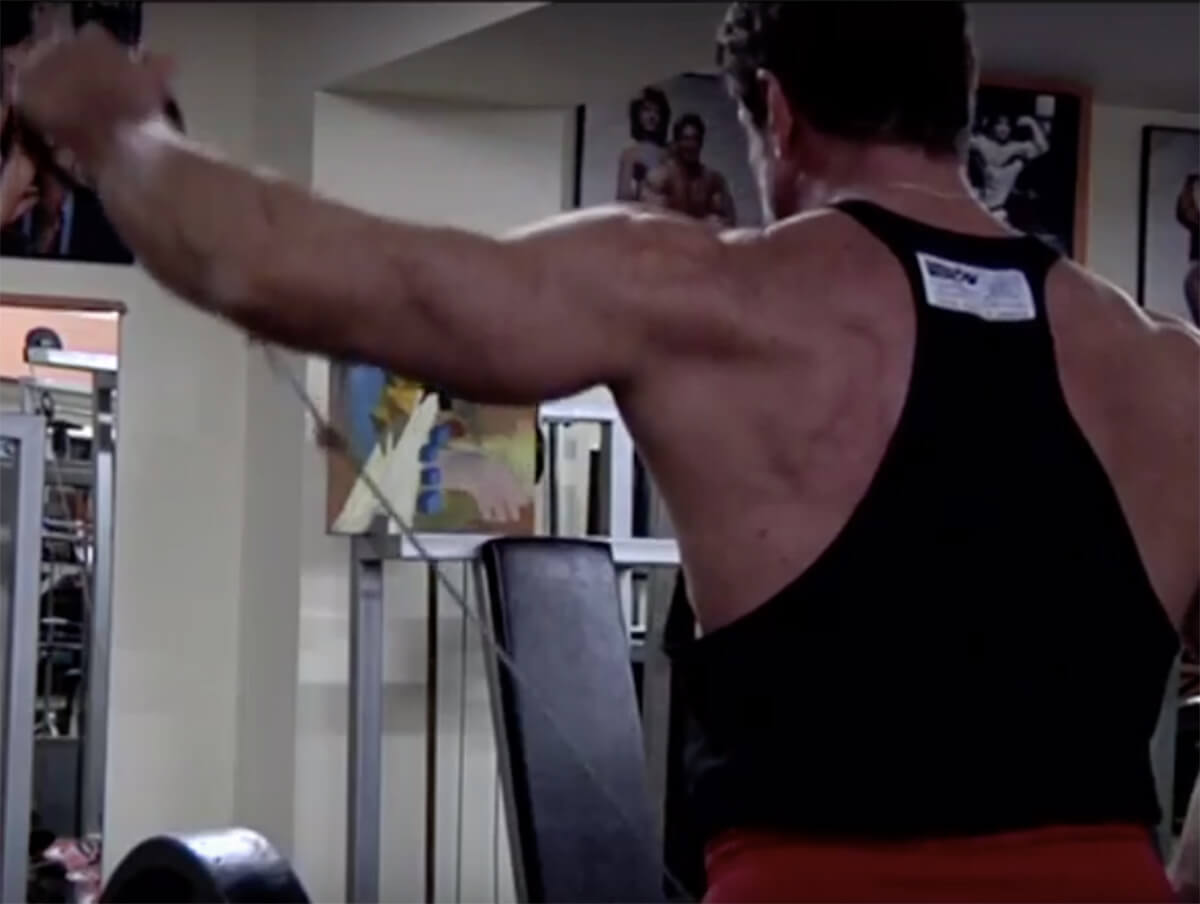
They had almost the same figure: they had pumped their way out of their individual, normative genders and become a new one, the same one, something less binary, less soft, less lucidly, predictably heteronormative. Not mom, not dad—something else. The woman’s breasts had become small, square pectoral muscles, like metal plates shifting under her dark, lubed chest; her partner’s were almost exactly the same. They wore tiny neon bathing suits streaked with body oil, likely coconut. Their short hair was spiked and bleached, a kind of straw. I could see their scalps.
Sitting next to the German-speaking bodybuilding couple, centered on a textured beach towel as though it were a platter, was a fat, milky baby, something seemingly biological and definitely nascent. It belonged to the couple, apparently, though nothing visually indicated this to me. The baby was pale and chubby, not fit, not pumped. It was wearing a heavy diaper; no neon, no spandex, no oil. Its skin was matte, not glossy. It didn’t seem to me, at that moment, that this baby could have come from them; could be, in any sense, in relation to them. I didn’t understand this trio’s language—not their spoken language, not their visual language. They were foreign to me, in every sense. I wondered why they had come all the way to Southern California, these strangers. I wondered what they wanted (to be) here in Venice Beach.
Three decades later I am one of them, at home on a towel on a beach on a shore not my own. I am not a bodybuilder, no, but I am a foreigner with a body, a stranger in Europe, with all the tropes, all the literary and political clichés that suggests (but not the violence—I am American, with papers, so how does one even speak of this). And so I wonder: not about language, not about the body, or about both of these things, which concern me daily. Mostly, though, I wonder about necessity and distance and becoming “alien,” as the wet-mouthed nationalists in my native country might put it. Wanting to be alien by transforming your body into an alien body: breaking it down, building it up. Pushing it past the limits of the known. Pushing it past language into some other kind of fluency. Becoming alien by understanding nothing of the language around you. Becoming comfortable in that alienation, that lack of language. Wanting difference, continually. Writing through it, constantly.
Acker writes: “After each workout, I forgot to write.” It’s a beautiful line, I think, in a somewhat boring and underwritten essay. In “Against Ordinary Language: The Language of the Body,” she quotes Canetti, Heidegger, and Wittgenstein, but it doesn't really go anywhere. She struggles to put into language the experience and meaning of bodybuilding, its relationship to her work as a writer, its relation—or lack of—to language at all. Her body, any body, feels far away from her text—there is nothing physical about it. The essay is dry, “unpumped,” as it were. It could use a workout, I thought.
Sitting there in that Athens gallery, crossing and uncrossing my tired legs, I could smell the coconut oil—Tropicana—on the bodies of the German-speaking bodybuilding couple from three decades ago. I could feel the soft, pale, fatty folds of their baby’s chubby legs against its thick beach towel. I could feel my legs underneath me, about to give out, but not giving out, as I ran my daily kilometers, not miles, at a small, shabby gym in Athens, not Los Angeles. I could feel this essay’s questions, its unstable but slowly strengthening then tiring language, and I thought it might be the season—not just of Acker but of weighted languages and physical exhaustion, all its varying paces and nonverbal understandings. Its time-sense, its heavy recurrence.
“I have been trying to write about bodybuilding. Having failed time and time again,” Acker writes in opening, “I made the following plan.” Immediately after each workout, she would describe all that she had just experienced. And yet: “After each workout, I forgot to write.” What is the meaning of her forgetfulness? It is something more deliberate than physical exhaustion, I imagine. And what is its relationship to its opposite, to memory, to imagining that one is—as she demands you to envisage—in a foreign country? “Within strangeness, you find yourself without a language,” Acker claims. This “strangeness,” for her, being a space wholly devoted to the body, to its estrangement and transformation—into another language, perhaps.
Contra to Acker, after each workout, I do not forget to write. It is not that. After each workout, the necessity to write—that which pulls me through my otherwise often inoperable days—temporarily ceases. It gives pause (I write this but I am not sure I would call it a gift). Physically spent, I feel no rush toward language. The strangeness of this feeling, its foreignness, never ceases. Even as it is ever repeated, serialized, by repeat performance. This is because, as I exercise, my mind is often on my writing. I access some part of my language-making mind that only comes into focus when I am moving. Headphones on, words and ideas—weighted but oh so light—come through. On a treadmill, facing the street, I stare out the storefront window, the gym like a vitrine in which I am the object, the passing strangers the spectators to some strange exhibition that has no import. In that lack—of attention, of bearing—language arrives, unsecured but constant. Like breathing.
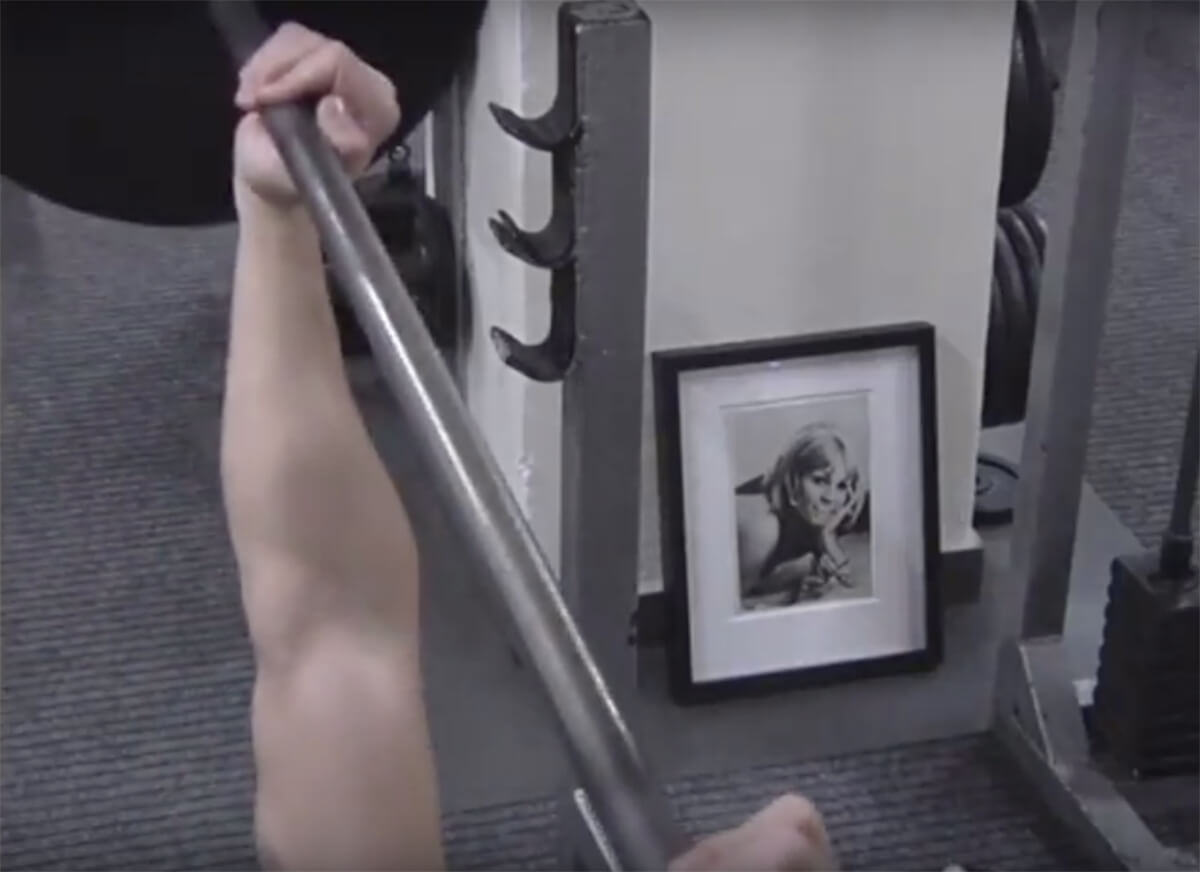
“Strange thoughts are bred in passing through crowded streets should the passenger, by chance, have no exact destination in front of him,” writes Virginia Woolf in Night and Day, “much as the mind shapes all kinds of forms, solutions, images when listening inattentively to music.”6 So it is. As I run and lines form, I repeat them over and over—sentences, words, entire passages—so as not to forget them. And then I finish my workout, go home, shower, and almost never write them down. The necessity for language has left my body along with my energy. I feel no need to translate my experience into writing. I am sufficient, nonlinguistic, breath and being only, just for a while.
And yet.
Of writing, Marguerite Duras notes: “[I]t’s almost a question of muscles, of physical dexterity. You have to move faster than the non-writing part of you, which is always up there on the plane of thought, always threatening to fade out, to disappear into limbo as far as the future story is concerned; the part which will never descend to the level of writing; which refuses all drudgery.”7 I dislike drudgery—who doesn’t—but I do not dislike, oddly, the drudgery of the body, nor the drudgery of writing. What is drudgery but rote repetition that leads nowhere but is the process and keeping up of—what—life and language itself? Without drudgery, the body will not remain strong; will not, in any case, remain. Without drudgery, writing will not materialize, will not, in any case, become form.
Drudgery: it is difficult to associate that word with Acker, her strange and dirty and phosphorescent glamour. In Inferno, Eileen Myles writes about a Semiotext(e) reading tour they did in Germany with Acker, Chris Kraus, Lynn Tillman, and others.8 Acker was the pale, elusive star of the show in a high collar, rose tattoos, and a real bitch, Myles writes. And yet: “Somehow in the van Kathy and I started talking about going to the gym,” Myles writes. “She turned to me with a look of shock that for like a second this person she’d been seeing around for twenty years also had a body. It was ghoulish of me. To be alive and have a body like hers. It was that two-minute opening you get with like Donald Trump.”9
Leaving that prescient reference to Trump aside (Not my president!, the million voices that compose a body scream, on repeat), I return to Myles’s previous line. To be alive and have a body like hers. I only know Acker’s body—illumined and wraithlike, arms as wrested as Madonna’s—from photos, but I remember Myles’s body from this past summer, when we were on an island together. Myles is brown and strong and slim, laconic, limpid. Their body, in the waves and without, moves as easily as a bandit, as though it had been stolen from some youth. Like the photo Myles writes about of themself as a kid, “stealing a nickel from a bank.”10 Myles was nine; they look like a boy. “I orchestrated the photo so I could be apprehended as a bad boy, a thief,” Myles writes. “Gender could be I guess just getting caught.”11 Whether caught or not, Myles’s body on the island seemed loose and free. In the sea, and without, we talked about writing. We didn’t talk about going to the gym—there was no need. We were walking up and down mountains that rose straight from the Aegean to a singular white village capping the sky like a cloud. Our calves ached from a thousand pale steps. Not reps but steps, but still a kind of repetition, a kind of refrain—of the summer, and of the Eastern Mediterranean.
As she moves through her essay, building her argument about bodybuilding’s rejection of the verbal, Acker concentrates on the little language that exists in the gym. That is, a nearly monosyllabic verbiage built of repetition, of counting reps, as it were. “The verbal language in the gym is minimal and almost senseless, reduced to numbers and a few nouns,” she writes. I think of the sets I do: ten or twelve. One, two, three, I count. I think of myself on the treadmill, counting down the minutes: Just ten more, five more, no, ten more now, etc. Beat, beat, stride, breath. The time-sense of the gym is built on reiteration, each syllable a breath, each sequence the syllabic expanse of one’s time-signatures.
Such recitations seem to suggest Deleuze and Guattari’s concept of the refrain, that which “fabricates time.” “Time is not an a priori form,” they note. “Rather, the refrain is the a priori form of time.”12 Rhythm is, recitation is. Counting reps, counting steps, claiming territory against chaos through narration, invokes their image of the child singing some small song in the dark to calm and orient himself. Expression as a form of the territorialization of the body, delimiting everything. “Perhaps the child skips as he sings, hastens or slows his pace,” they write. “But the song itself is already a skip: it jumps from chaos to the beginning of order in chaos and is in danger of breaking apart at any moment.”13 Their song, then, rhymes with Acker’s observation that, “in the gym, verbal language or language whose meaning occurs, if at all, only at the edge of becoming lost.” Of becoming lost or at the edge of time itself.
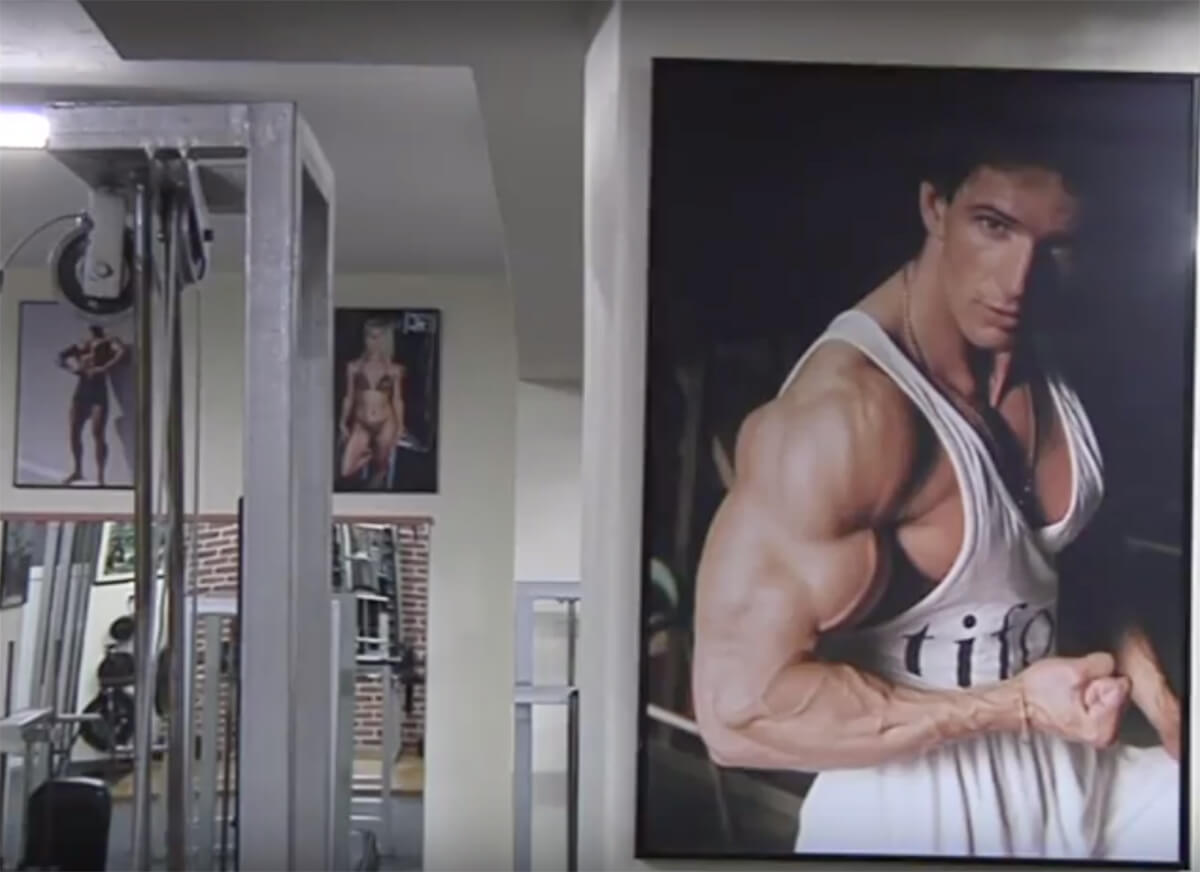
What is the time of the gym made of? Experiential time or the abstraction of pure presentness? Thinking time as structure, I wonder: does exercise manage time or fabricate it? Why this turn to the temporal at all? Running against time, as the cliché goes. Running to make time. Working out to delay time’s damage to the body. Running to fabricate the slowness of time, to make it slow, to make you fast. To be faster or slower than time. In all cases, though, the time of the gym, of physical exhaustion, is a kind of suspension of normative temporality. It makes time count, as it were, as another cliché—so true—goes.
Jill Johnston once wrote that, “there is something even slightly grotesque about playground activity subjected to signal commands at regular intervals.”14 Is there? Though she was considering a performance of Yvonne Rainer’s Parts of Some Sextets (1965), I read Johnston’s line and see myself on the treadmill, counting down the clock, the perfect worker of leisure. The serialized, standardized time of capitalist temporality, the time-space of production: this has everything and nothing to do with the contemporary body in exercise. Rainer herself once said of Parts of Some Sextets, which as Catherine Wood has written, led to her germinal work The Mind Is a Muscle (1968), that in its “repetition of actions, its length, its relentless recitation,” was “like a treadmill.” Though Rainer would also trash what she called “the touring treadmill,” that is, “performing as an end in itself.”15 Bodybuilding as an end in itself. Running as, breathing as.
And yet.
In the gym things are done in the time it takes to do them, or time is structured by a given form. That is, both. Does one do a forty-minute run, say, or does one take the time it takes to run seven kilometers, no matter how long it takes? Do you lift weights for exactly 35 minutes or do you do 15 reps of 10 machines? Do you manage time or do you fabricate it? How to handle this dialectic? And what is its effect on language? There is something deeply nonassociative about seriality, about reps and the refrain, and yet unmistakably associative at the same time. Associative meaning pertaining to language, to meaning, and to its home in the body. Solange once noted, when talking about her recent album When I Get Home and its minimal tendencies and employment of repetition, that: “When I said, ‘I saw things I imagined,’ maybe the first four times, I didn’t actually really believe it, but by the eighth time, it’s coming into my spirit, coming into my body.”16
Repetition does not always underline capitalist temporality, sometimes it can disable it—calling instead to the spirit, coming into it. In the wonderfully titled essay “Women’s Time in Theory,” Emily Apter writes that those thinkers of the “untimely”—Nietzsche, Marx, Freud, Bergson, and Benjamin, among others—“disabled the time signatures that assign tempo to the capitalist temporality underwriting labour, production, profit, and social calculation.”17 Regardless, thinking about both Solange’s and Rainer’s productions, their insistent and bodily recitations of sound and movement, I can see—framed, as if on a stage—the casual theatricality of the gym, of “the muscular dynamics of everyday life,” per Carrie Lambert-Beatty.18 Of the gym as a space in which time collapses, suggesting both the nostalgia of period styles and some projected modernist timelessness. Actually, I am thinking of an exhibition I never saw, built on both the fact and idea of a gym for bodybuilding in Athens.
Imagine you are in a foreign country. The gym, say, or Greece. A gym for bodybuilding in Athens, as it were. A place that rejects verbal language, per Acker. In 2010, in Athens, the artist Rallou Panagiotou and gallerist Andreas Melas curated SUPERNATURE: An Exercise in Loads, a show inspired by a cult Greek bodybuilding gym. Owned by Spyros Bournazos, a famous bodybuilder as well as an actor in various Greek underground films, the esoteric gym—all mirrored walls, framed and faded posters of bodybuilders, kitschy copies of ancient Greek statues, and gold bodybuilding trophies—is described by Panagiotou as a “unique hybrid of formal qualities,” with a distinctly cinematic air. The exhibition pointed to the gym’s doubling of time, as a space that fostered the hyper-desirous activity of competitive bodybuilding—the making of future bodies via insistent physical repetition—as well as acted as a nostalgic archive of this sport in Greece beginning in the 1970s and stretching into the ’90s. “Overall it was plastic and punk, dreams and protein,” Panagiotou tells me. “A pumped up figuration was suggested in a sweaty exaggerated way.”
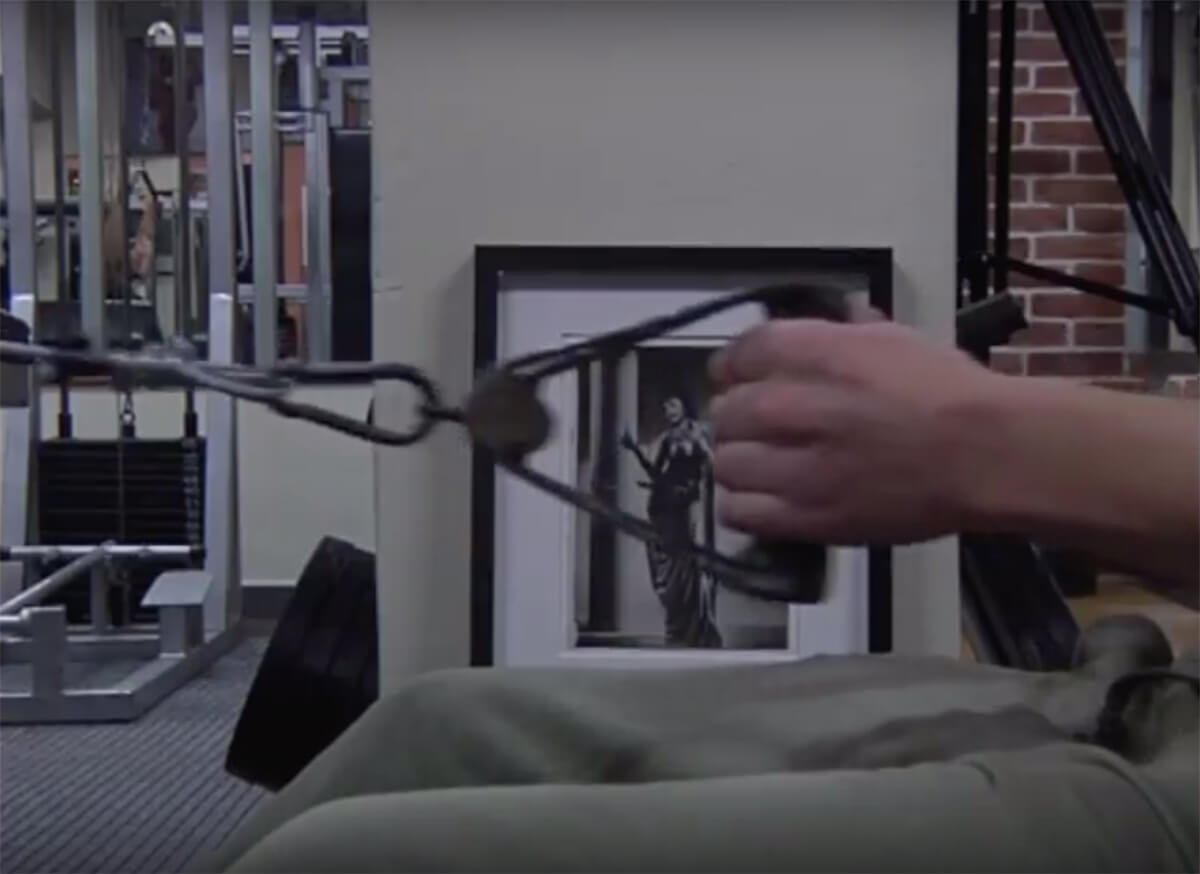
SUPERNATURE framed the hardcore local and private aspect of the small gym with its window onto Troy Street and longing for the larger international bodybuilding scene, while focusing on the simultaneously melancholic-psychedelic tenor of the sport itself, in which the physical transformation of the body collapses aesthetics with anxieties about nature and artifice, construction and transformation, past and future, the normative and the virtuosic deviation from. At the exhibition’s opening, at AMP in Athens, professional bodybuilders posed on stage among the works by contemporary artists including Charles Atlas, Annette Kelm, George Lappas, Robert Longo, Linder, Jack McConville, and Jennifer West. Some of the works were previously installed in the original gym, where they were documented by photo and video, filmed by Panagiotou, as bodybuilders pumped iron around them. This documentation was then installed in the gallery, bringing the show’s fetishistic point of origin, the cult gym itself, into the gallery’s white space.
The flyer for SUPERNATURE features an archival image of Bournazos, posing and flexing on a plinth-like slab of marble on a hill of olive trees below the Acropolis. I study it. His popping veins appear as a series of tributaries mapping some strange new-old territory, against the familiar series of white-marble columns colonnading the blue distance. His familiar pose—a kind of strongman semaphore seen on ancient amphora and sculptural figures of marble—and tanned, hyper-articulated body, draws some map between Ancient Greece and Venice Beach, temple and boardwalk, the spectacle of the Olympic Games and the privacy of the local gym, the international stage and the neighborhood storefront, between some nature and some supernature and the fetish and fact of the unnatural become naturalized, become second nature. Between the failure of memory and the failure of muscle memory. Memory Is a Muscle, Rainer reminds us. So it is, forever repeating, failing, regenerating, breaking down, building back up, and again.
Why do things recur, repeat—not only in our mouths, not only in our heads, not only in our bodies, no, but in, what, the culture? For example: bodybuilding. Or Acker. She is everywhere, at present. As a subject, as an object. There are critical biographies in which the biographer adroitly attempts to objectively understand Acker’s oeuvre and irresistible draw, and there are slight autofictions in which the novelist attempts (inexplicably) to appropriate her as their avatar.19 There are exhibitions of Acker’s minutiae, her papers, her drawings in the Northern capitals; there are reading groups in small galleries in the Eastern Mediterranean devoted to her. And then, yes, bodybuilding, too. I keep running into artists who have begun bodybuilding—you often know it before they say it—or artists who have left the art world to become trainers (of other artists). Beyond the specifics of the sport, there is the new-old industry of wellness and selfcare and gym memberships. A body, like a historical figure and her estate, requires upkeep. In order to keep circulating, I mean.
“When I reduce verbal language to minimal meaning, to repetition, I close the body’s outer windows,” Acker writes at her essay’s close. “Meaning approaches breath.” The stanza is a room, I think. Why not close its windows? The windows of a gym, crossed with light and sweat and salt and dust and exhaust from the street. The windows of a body, through which one is constantly looking out. Breathe and repeat. In Acker’s essay, which, in the end, is less about bodybuilding than about the building of language, an Ars Poetica for the late-capitalist era, she asks: “What is the picture of the antagonism between bodybuilding and verbal language?” Yes, even so, what is it? Is it a picture of an eighties-era bodybuilder, slightly faded, framed on the wall of gym? Is it a picture of a California boardwalk, attenuated palms and hyperpumped bodies crossing it in the strange Western consumerist breeze? Is it the picture of a glass storefront in the East, worn workout equipment glimmering inside, riot police forever hassling refugees outside? Is it the picture of some private window, closed and drawn, an alien body breathing and counting and running and writing on the other side? Is it the picture of a writer, forever returning, some childhood forever returning, some body, new and old and new again, forever returning and counting and constellating and failing, then delicately repeating, and again? Is it the strange space of breath, the space of each body, imaging and imagining itself anew, becoming newly foreign, faltering, then continuing? Something like that?
-
This essay began as an email to artist Aliki Panagiotopoulou and curator Helena Papadopoulos in the context of a collaborative project for Mahler & LeWitt Studios in Spoleto, Italy.
-
Polykatoikia refers to the residential housing blocks that typify Athens and are one of the main architectural typologies found there. Originally an academic architectural term—it literally means multi-residence—to describe Athenian apartment buildings, the polykatoikia arose in 1929 with legislation that regulated horizontal property ownership as an exchange between a property owner and a contractor.
-
The artist who organized the Kathy Acker reading group was Jesper List Thomsen. In April 2019, he presented BASE BASE etc. at Hot Wheels Projects, in Athens, a six-day reading event that considered “the body and its language, political perversion, public performance, bodybuilding, the vernacular of the gym, and the coalescence of corporal and semantic expression.”
-
The gallerist is Hugo Wheeler; his gallery, Hot Wheels Projects, Athens.
-
Kathy Acker, “Against Ordinary Language: The Language of the Body” (1993). In Bodies of Work, London and New York: Serpent's Tail, 1997. All quotes by Acker are from this essay.
-
Virginia Woolf, Night and Day. London: Penguin Classics, 1992.
-
Marguerite Duras, “The Black Block.” In Practicalities. Trans. Barbara Bray. New York: Grove Press, 1987.
-
Eileen Myles, Inferno (a poet’s novel). New York: OR Books, 2010.
-
Ibid.
-
Eileen Myles, Afterglow (a dog memoir). New York: Grove Press, 2017.
-
Ibid.
-
Gilles Deleuze and Felix Guattari. “1837: Of the Refrain.” In A Thousand Plateaus: Capitalism and Schizophrenia. Trans. Brian Massumi. Minneapolis: University of Minnesota Press, 1987.
-
Ibid.
-
Jill Johnston quoted in Carrie Lambert-Beatty’s excellent essay on Yvonne Rainer, “How to Manage Time.” In Yvonne Rainer: Space, Body, Language. Bregenz and Cologne: Kunsthaus Bregenz and Museum Ludwig, 2012.
-
Catherine Wood, “Work and ‘Work’.” In Yvonne Rainer: Space, Body, Language. Bregenz and Cologne: Kunsthaus Bregenz and Museum Ludwig, 2012.
-
Britt Julious, “'Blackness will never go away': how Solange takes pride in her roots.” The Guardian, March 6, 2019. Accessed on August 29, 2019, at: https://www.theguardian.com/music/2019/mar/06/solange-when-i-get-home-houston-texas-roots-multimedia
-
Emily Apter, “Women’s Time in Theory.” In differences: A Journal of Feminist Cultural Studies, vol. 21, no. 1 (2010).
-
Lambert-Beatty, “How to Manage Time.”
-
I am referring here to Chris Kraus’s After Kathy Acker: A Biography (Penguin, 2017) and Olivia Laing’s Crudo: A Novel (W. W. Norton & Company, 2018).